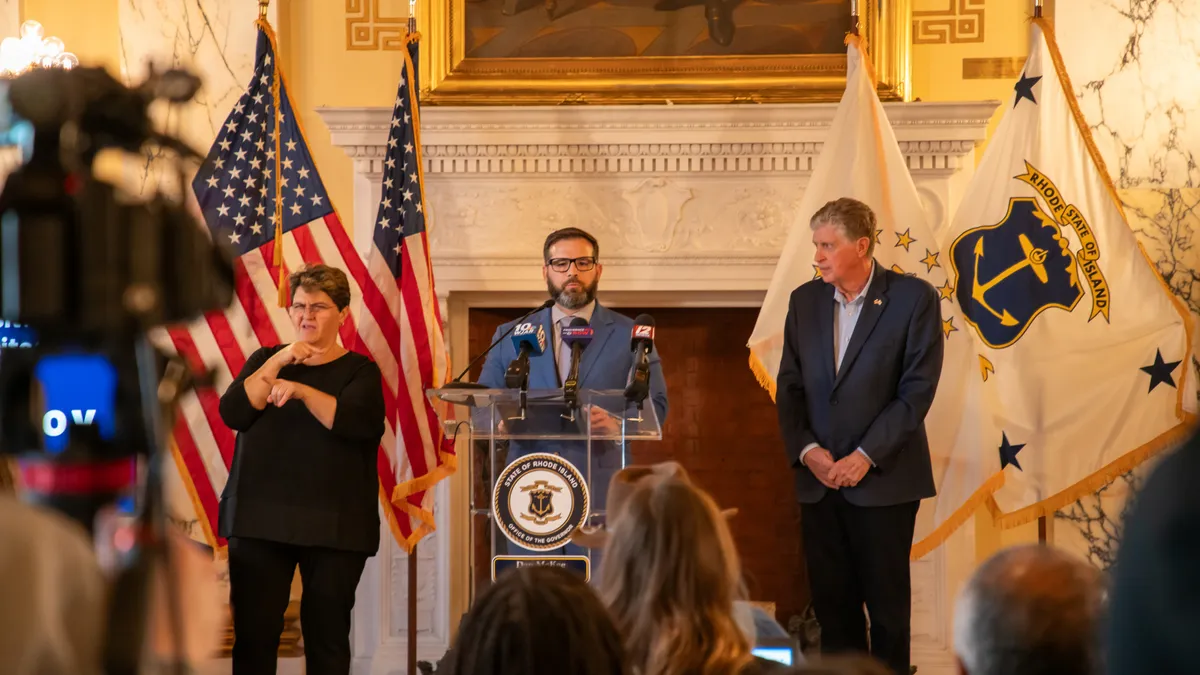Late last year, New York University (NYU) and the U.S. Conference of Mayors (USCM) marked a new chapter in smart cities with the launch of the Mayors Leadership Institute on Smart Cities.
The institute, run in collaboration with NYU’s Robert F. Wagner Graduate School of Public Service, brought together 10 selected mayors in early December for a three-day workshop to discuss urban challenges and opportunities — covering everything from parking to efficiencies in city government — and how they could use technology to help. The next workshop is set for May.
Neil Kleiman, a professor of practice at the Wagner School, said it is part of a renewed commitment to researching urban issues at NYU, sparked by the arrival of president Andrew Hamilton in 2016 and continuing the work it already does in cities across the world.
Smart Cities Dive caught up with Kleiman at the U.S. Conference of Mayors’ Winter Meeting in Washington, DC to hear more about the institute, its work and how leaders are trying to play a bigger role in the innovations happening in their cities.
This interview has been edited for clarity and brevity.
SMART CITIES DIVE: A lot of NYU's research has become focused on cities. What prompted that shift?
NEIL KLEIMAN: The fact that we are in NYC, by far the largest city measured by almost anything — whether it's by population, commerce or GDP, and we are the largest private university in North America — there's a huge amount of urban research going on just generally. But we haven't really been oriented toward presenting that research in a coherent fashion, and that has really begun to shift with the relatively new president we have, Andy Hamilton, who has made cities and urban research a top priority for the university.
That's playing out in all kinds of ways, including the university-wide urban initiative, hiring that's happening university-wide around urban issues, the development of an urban data analytics program in which we have created something called the Administrative Data Research Facility, in which we are ingesting big administrative data sets from governments all over the country at different jurisdictional levels. They are working with us to receive executive and professional training, but also are providing data that we are housing at our ADRF facility.
There's just so much going on, and it's playing out in a curricular way in a redoubling of a commitment to New York City and other cities around the country, but also in a way in which we're trying to advance a more coherent approach and connected approach to all our urban research that has been mighty for quite a while but hasn't been as orchestrated.
NYU had its first meeting with the 10 mayors in December. What did that look like?
KLEIMAN: In a way, it's really run like a workshop ... We worked together, both to better understand what are the big issues around data and technology and smart cities, and we defined that as a peer-led group. Then we work very intentionally around the opportunity that they bring to the table, whether that's technology that can be used to better gain citizen input or whether that's a way of using blockchain to better coordinate existing databases within local government.
We split the mayors up into different groups based on what they're interested in, geographies and population, then we match them with different experts, whether those be researchers, scholars, but also technology officers that have been proven effective in terms of their work in other major cities. We have tech officials from Boston, Los Angeles and New York City that participated in the last one, and we break them out into small groups and flip them around so that everybody has an opportunity to work with one another in a very small setting.
I imagine that's a really different feeling from meetings hosted by the likes of USCM, which bring together hundreds of city leaders, business leaders and everything else.
KLEIMAN: It's like night and day in terms of the goals, the spirit and the approach. What I would say, interestingly, is there are a lot of those workshops and conference-like convenings with many of the senior officials that are charged with data and technology at the local level happening already. There are all kinds of gatherings of Chief Information Officers (CIOs), Chief Data Officers (CDOs), CIOs meeting with CDOs and then meeting with chiefs of staff. These meetings are happening constantly, but there has never ever been one just for mayors on data and technology issues in the U.S.
We're really encouraged that this small group setting can not only advance what the mayors are doing but be done in such a way that it links up with what a lot of their top aides have been doing in smaller workshop-like settings over the past five to 10 years.
The press release announcing the institute said smart cities have been a bit "industry led." Why do you think that is, and how have you tried to shift that back towards city leaders?
KLEIMAN: From a lot of work I've done directly with mayors and cities, if you approach the average mayor and ask them their view of smart cities, they often will roll their eyes and have a beleaguered response that they're annoyed that the definition has been one that comes from the private sector and that they're being pitched all the time.
An anecdote I hear constantly is these CDOs and CIOs and senior officials charged with these issues get very frustrated when their mayors go off to conferences and they come back and slam a brochure on the table and say, "You know what? We've got to adopt this platform or that platform," based on whichever private vendor they met at a conference.
There's just a tremendous amount of pitching going on, and not a lot of open discussion about what the genuine priorities are for the city. Start with that, don't start with the technology. I think the goal here is to flip the proposal and have technology come after the priorities are established by the mayors. That's difficult to do when you have a vendor-led discussion.



















